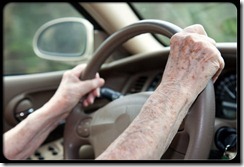 Imagine being a prisoner in your own home, unable to visit friends, make it to doctor appointments, eat out, attend cultural events or shop for groceries unless someone is available to drive you. After an exodus to the suburbs in the 1950s, operating a car became a necessity for getting to work, maintaining our daily lives and connecting with friends and family. But as we get older, driving can become a challenge. What circumstances might make driving no longer a good choice for a senior living in Thousand Oaks? Aside from a major health setback such as a stroke or a broken hip, other consequences of aging can make driving difficult for seniors: Low vision, night blindness or loss of peripheral vision; difficulty walking long distances in parking lots or carrying heavy packages; joint stiffness in hands, legs and neck. Seniors may also fear getting lost as new streets and routes are created. Socially responsible seniors accept their challenges and voluntarily give up the keys...
Imagine being a prisoner in your own home, unable to visit friends, make it to doctor appointments, eat out, attend cultural events or shop for groceries unless someone is available to drive you. After an exodus to the suburbs in the 1950s, operating a car became a necessity for getting to work, maintaining our daily lives and connecting with friends and family. But as we get older, driving can become a challenge. What circumstances might make driving no longer a good choice for a senior living in Thousand Oaks? Aside from a major health setback such as a stroke or a broken hip, other consequences of aging can make driving difficult for seniors: Low vision, night blindness or loss of peripheral vision; difficulty walking long distances in parking lots or carrying heavy packages; joint stiffness in hands, legs and neck. Seniors may also fear getting lost as new streets and routes are created. Socially responsible seniors accept their challenges and voluntarily give up the keys...